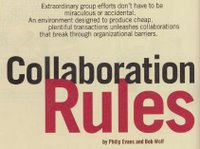"The big boys, corporations and governments, have far more reason to be interested and concerned this time," said Eben Moglen, general counsel to the Free Software Foundation, which holds the license, commonly known as the G.P.L.
The process will also be closely watched for how the new G.P.L. will take account of software patents, which have exploded among proprietary software developers since 1991, the last time the license was revised.
One person who has watched the open source community especially closely is my colleague Bob Wolf  at BCG. He published an outstanding analysis of how open source works in the July-August 2005 Harvard Business Review. Click on the title page at right to read it.
at BCG. He published an outstanding analysis of how open source works in the July-August 2005 Harvard Business Review. Click on the title page at right to read it.
Bob and his coauthor Philip Evans compare Linux developers to the Toyota Production System and draw fascinating conclusions on what big business can learn from rebel hackers. Jack Vinson at Knowledge Jolt gave a good summary of these lessons back when the article was originally published. To Jack's comments I add that the HBR article does a nice job of distinguishing two kinds of trust: (1) Trust based on reputation, and (2) Trust based on reciprocity. Open source depends more on the first. I may not ever repay your favor directly (a requirement of reciprocity) but if I screw you then the word spreads so fast that my reputation across the entire community will be ruined. So for the sake of their reputations, group members all play nice, develop great trust for each other, and thereby enjoy very low "transaction costs" (e.g., fewer contracts).
Copyright (c) 2005 Connective Associates, except where otherwise noted.


No comments:
Post a Comment